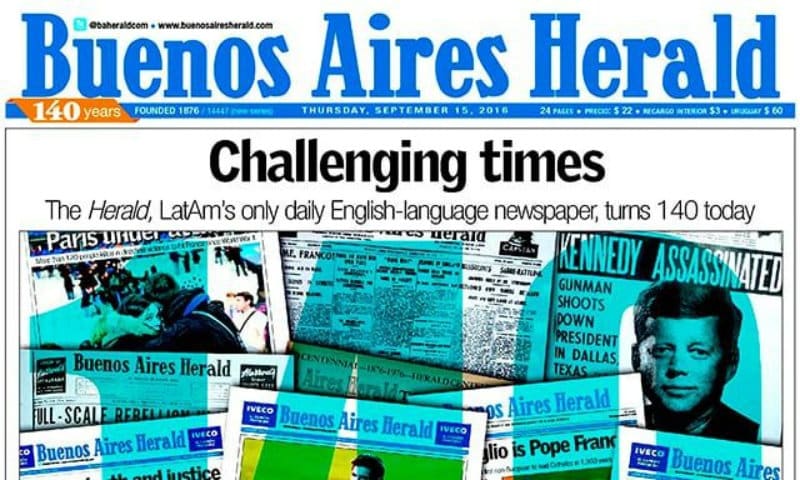
BUENOS AIRES – The Buenos Aires Herald, a long established English-language newspaper lauded for its coverage of Argentina’s 1976-1983 military dictatorship, will close after more than 140 years of publication, the newspaper said late on Monday.
“Herald’s staff have been informed that the newspaper is closing,” the paper said in a Twitter message, along with a photo of the front page of its 140th anniversary edition from last September.
Herald's staff have been informed that the newspaper is closing.
Our front page when we turned 140 on September 15, 2016. pic.twitter.com/5or01KqDy6— Buenos Aires Herald (@BAHeraldcom) July 31, 2017
The move comes less than a year after the paper, which once called itself the only English language daily in Latin America, switched to a weekly print edition, blaming tough economic conditions and a broad shift among readers to digital media.
The Buenos Aires Herald, closely associated with Argentina’s British and, in later years, U.S. community, won praise for its coverage of the “disappeared” – people who were forcibly abducted, tortured and often murdered by the state during the dictatorship – when much of the country’s media stayed silent.
The Herald is majority-owned by the Indalo Group conglomerate, which also owns local financial paper Ambito Financiero.
The Buenos Ayres Herald (the original spelling) was founded in 1876 by William Cathcart, an ageing Scot who had spent 50 years in “the Argentine.” It constituted of a single sheet with advertising on the front and mostly shipping coverage on the back (with the odd general news and community item thrown in).
A year later Cathcart sells the Herald to D.W. Lowe of the United States, who immediately discards the Cathcart principle of weekly publication in favor of daily news (or at least when there is enough news to fill the paper).
In 1913 Thomas Bell the Herald’s editor-owner for over 30 years, is replaced as managing editor by Hugh Lancelot Lyall. Under Lyall, the Herald evolves from a sporadic daily to a newspaper which has appeared 360 times a year for the last eight decades almost without fail. His trenchant editorials become a defining trademark of the newspaper. In 1920 the Herald becomes a public company.
Five years later the newspaper is purchased by brothers Junius Julius (J.J.) and Claude Ronald Rugeroni whose family originally left Italy for Britain in the nationalist upheavals of the early 19th century and actually came as Englishmen rather than Italians. From the outset they work towards the modernization and expansion of the newspaper.
In 1968 sees important changes at the Herald – a controlling block of shares (largely corresponding to J.J. Rugeroni’s) is purchased by the Evening Post Publishing Company of Charleston, South Carolina; a Rugeroni cousin (Robert) Basil (Hamilton) Thomson of Ramon writes fame becomes president of the company and Robert Cox becomes editor. The concept of “an Argentine newspaper in English” resurfaces and Cox was to give it flesh and blood.
In 1979 threats from the military government against his family finally force out Robert Cox, who leaves for the United States to become an editor at The Post and Courier in Charleston where he remains to this day. James Neilson takes over as editor and carries on from where Cox left off on the editorial front. Kenneth Rugeroni becomes president of the company.
During the Falklands conflict in 1982 the distributors’ association the Herald’s access to the newsstands as a “patriotic gesture,” thus forcing readers to come to the office to buy the newspaper. Despite this action, readers continue to use the Herald as a lens through which they view the world.
In 1998 Ruggeroni sells his shares in the paper to The Evening Post Publishing Company, which becomes sole owner of the Herald, and in 2007 The Evening Post Publishing Company sells the paper to Grupo 23. A year later Grupo 23 sells the newspaper to AmFin SA, which embarks on a program to modernize the paper.



